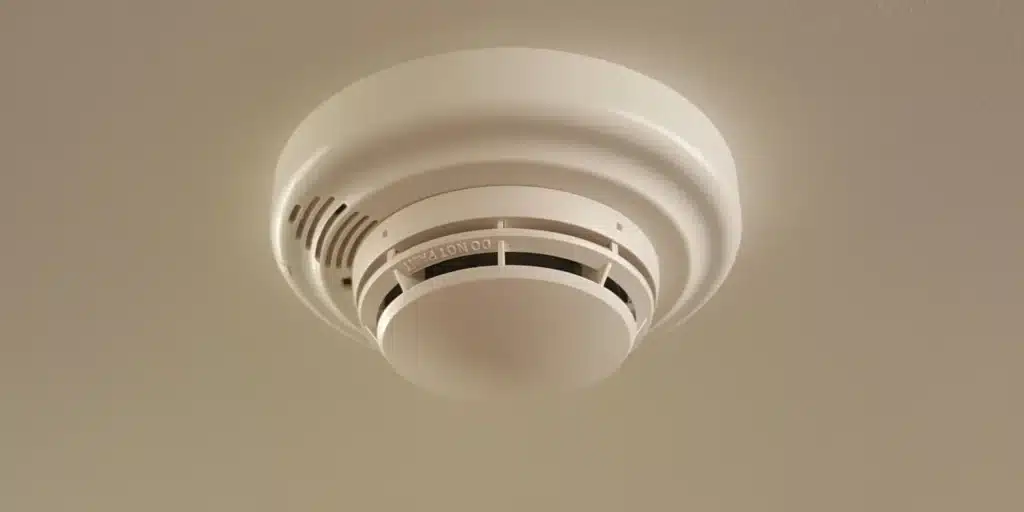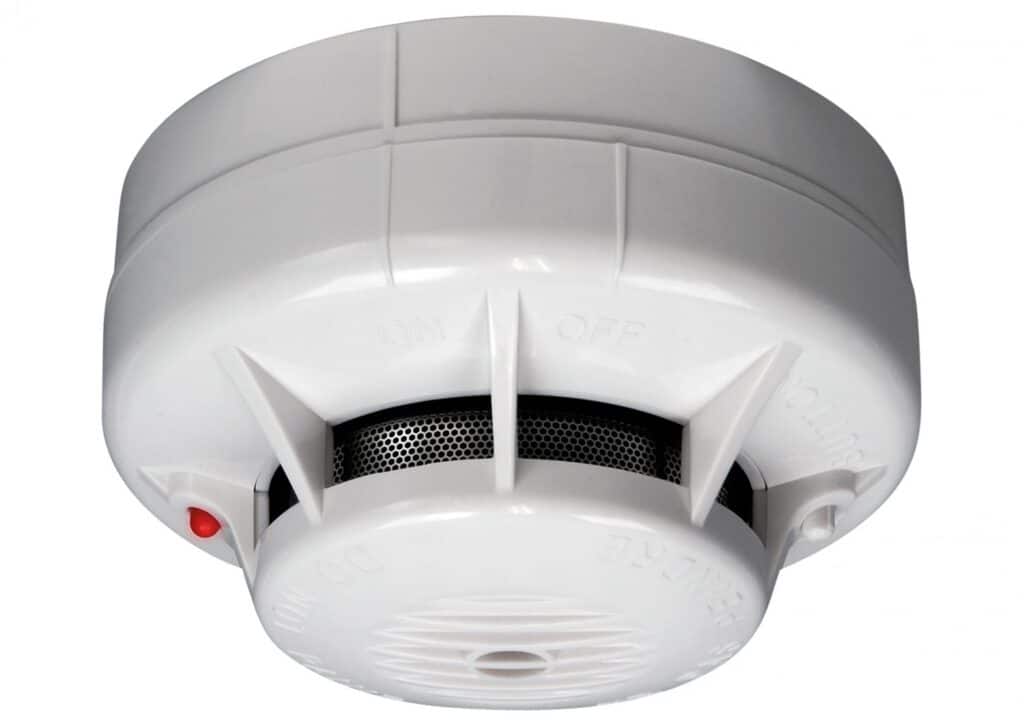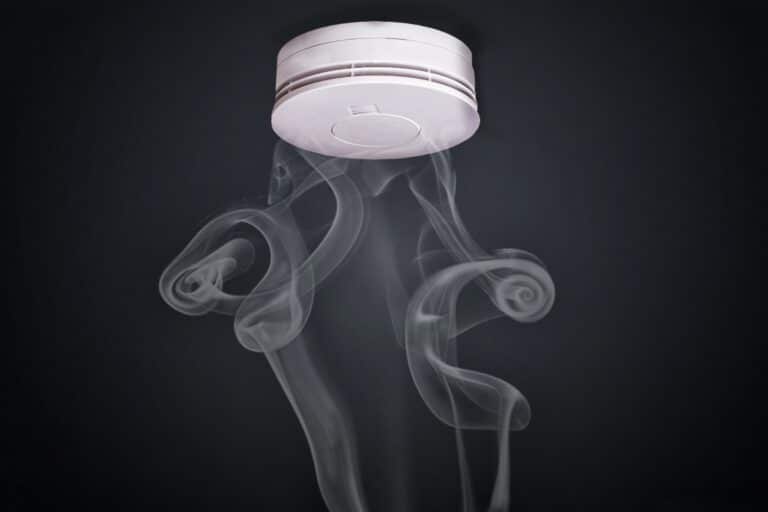Introduction
How Often To Replace Smoke Detectors: Smoke alarms are an important part of every home’s safety system. They let people know early on when there’s a fire, so they can leave and call the fire department right away. A lot of people don’t know how often to replace their smoke alarms, though. This piece will talk about the guidelines that should be followed when replacing smoke detectors and explain why these guidelines are important.
According to the National Fire Protection Association (NFPA), smoke detectors should be replaced every ten years. This is because the sensors in smoke detectors motion can become less sensitive over time, reducing their effectiveness in detecting smoke and fire. Additionally, the batteries in smoke detectors should be replaced at least once a year, or whenever the low battery warning chirps are heard.
Both hardwired and battery-powered smoke alarms need to be replaced every ten years. A smoke alarm that works might not be able to find smoke as well as a brand-new one. To keep your home and family safe, make sure you replace smoke alarms when the time comes. When replacing smoke alarms, you should think about more than just the ten-year rule. Smoke detectors that are dusty, dirty, or contaminated may need to be changed more often. If you accidentally break a smoke detector or it has been through big changes in temperature, you might need to get a new one before 10 years are up.

What is the average lifespan of a smoke detector?
The average lifespan of a smoke detector refers to the length of time that a smoke detector is expected to function properly and effectively. Smoke detectors are essential devices that help protect homes and businesses from the dangers of fire by detecting smoke and alerting occupants to potential danger.
Most smoke alarms last for 10 years. This means that after 10 years, a smoke monitor may not work as well or as reliably. Over time, smoke alarm sensors and parts can break down or stop working. For the best results, smoke detectors should be changed every 10 years.
However, smoke detector lifespans depend on several circumstances. Quality and brand can affect smoke detector lifetime. Cheaper, lower-quality smoke detectors may last less. Environmental factors including humidity, temperature, and dust can also shorten smoke detector lifespans.
Smoke detectors can last longer if they are tested and maintained regularly. To make sure smoke detectors work well, they should be tested once a month. To make sure the alarm works, you can press a test button on the smoke monitor. It can also last longer if you clean the smoke alarm every so often to get rid of dust and other debris.
Are smoke detectors only good for 10 years?
Smoke alarms are very important for safety because they can save lives by letting people inside a building know when there is smoke or fire. But smoke detectors have a limited life span, just like any other electronic gadget. Most experts say that smoke detectors should be changed every 10 years because the sensors can lose their sensitivity over time, making them less good at finding smoke.
Smoke alarms only last 10 years because the sensors wear out. Ionization or photoelectric sensors are used in smoke alarms to pick up smoke in the air. These devices can lose their sensitivity when they get dirty or worn out. This means the smoke alarm might not pick up smoke quickly or correctly, which could put people inside at risk.
Smoke detectors also have shorter lives when parts inside them break down. Smoke alarms break down just like any other gadgets. Too much heat, humidity, and other outside factors can damage internal parts, leading to failures or false warnings. Every 10 years, smoke alarms should be replaced to make sure they have the most up-to-date technology and work properly.
The 10-year life of smoke alarms is also affected by changes in technology and safety rules. Over time, smoke detector technology has gotten better with the creation of dual-sensor smoke alarms that use both ionization and photoelectric sensors. People can make the most of these improvements and make sure they have the most reliable and effective system by replacing their smoke alarms every 10 years.
How often should you replace a smoke alarm?
Smoke alarms are an essential safety feature in every home, providing early warning in the event of a fire. However, like any other device, smoke alarms have a limited lifespan and need to be replaced periodically to ensure they continue to function effectively. The frequency at which you should replace a smoke alarm depends on several factors, including the type of alarm and its power source.
Most ionization smoke alarms use 9-volt batteries. Small amounts of radioactive material in these alerts ionize the air. Degrading this chemical reduces alarm sensitivity. Ionization smoke alarms work best when upgraded every 10 years.
People like photoelectric smoke alarms that have lithium batteries that last 10 years. Lasers in these smoke alarms pick up particles in the air. Ionization smoke alarms are cheaper than photoelectric alarms, but photoelectric alarms are better at finding burning flames, which smoke a lot before they start to burn. Every 10 years, smoke alarms that use light should be updated.
Hardwired smoke alarms may contain batteries and be home-powered. The alarms in contemporary homes give continuous protection. Hardwired smoke alarms endure longer than battery-powered ones but need replacing every 10 years.
These generic guidelines may vary by manufacturer and local law. To ensure optimal operation, examine smoke alarms regularly. Replace a smoke alarm that fails a test or shows damage immediately, regardless of age.
How long do 10 year smoke detectors last?
Smoke detectors are an essential safety feature in any home or building, as they provide early warning of a potential fire. However, like any electronic device, smoke detectors have a limited lifespan and need to be replaced periodically.
10-year smoke detectors don’t need batteries for a decade. A lithium battery is usually integrated into these smoke detectors to last for 10 years. This prevents battery changes and keeps the smoke detector working.
Attention: The 10-year lifespan relates to the smoke detector’s battery life, not its entire lifespan. The battery may last 10 years, but the smoke detector may need to be replaced. Over time, smoke detector internals wear out, diminishing their ability to detect smoke and fire.
Many makers say that 10-year smoke detectors should be replaced every 10 years, even if the battery is still good. This makes sure the smoke alarm is working right and can find fires. To make sure it works perfectly, check the smoke alarm often and replace it right away if it breaks.
How do I know if my smoke detector is expired?
Smoke detectors are an essential safety feature in any home or building. They are designed to detect the presence of smoke and alert occupants to the potential danger of a fire. However, like any other device, smoke detectors have a limited lifespan and can expire over time. It is important to know how to determine if your smoke detector is expired to ensure that it is functioning properly and providing the necessary protection.
Check your smoke detector’s manufacturers label or paperwork for expiration. Smoke detectors typically last 8-10 years. Labels and user manuals may list expiration or replacement dates. The smoke detector must be replaced after expiration.
Looking for wear and tear or damage can indicate an expired smoke detector. Smoke detectors decline due to dust, sensor degradation, or physical damage. Replace expired smoke detectors with cracked casings or discolored sensors.
Some smoke alarms have lights that show when they need to be replaced or when they are about to expire. Alarms that flash, beep, or speak are some examples. If any of these are on, you should get a new smoke alarm.
Even when your smoke detector isn’t expired, test it periodically to make sure it’s operating. Use smoke detector test spray or the device’s test button. Test and maintain your smoke detector to detect and warn of fires.
Every 10 years, smoke alarms need to be changed. Smoke alarm sensors and parts break down over time, making them less effective at finding fires. If you replace your smoke detectors every 10 years, they will always be up-to-date and protect your house.
Even if your smoke detector works after 10 years, replace it. Many newer models have better detection and early warning functions. Batteries and devices run better with regular replacement.
How frequently should smoke detectors be replaced?
The recommended frequency for replacing smoke detectors is every 10 years. This is because the sensors in smoke detectors can become less sensitive over time, reducing their effectiveness in detecting smoke and fire. Additionally, the batteries in smoke detectors should be replaced at least once a year, or whenever the low battery indicator starts beeping.
It is important to note that the 10-year replacement guideline applies to both hardwired and battery-operated smoke detectors. Even if a smoke detector appears to be functioning properly, it is still necessary to replace it after 10 years to ensure optimal safety.
Regularly testing smoke detectors by pressing the test button is also crucial to ensure they are functioning correctly. If a smoke detector fails to sound the alarm during a test, it should be replaced immediately, regardless of its age. The safety of your home and loved ones should always be a top priority, and replacing smoke detectors at the recommended intervals is an essential part of maintaining a safe living environment.
When is it necessary to replace smoke detectors?
It is important to update smoke detectors on a regular basis to make sure they keep finding smoke and sounding the alarm early in case of a fire. Every 10 years is the best time to replace a smoke detector. This is because the smoke detector’s electronics and other parts can break down over time, making it less accurate at finding smoke.
Additionally, it is important to replace smoke detectors if they have been damaged or if they are not functioning properly. Signs that suggest smoke detectors need to be replaced include frequent false alarms, a weak or inconsistent alarm sound, or if the smoke detector fails to sound an alarm during a test. It is crucial to address these issues promptly to ensure the safety of your home or workplace.
What is the lifespan of a typical smoke detector before replacement is required?
Different types and models of smoke detectors have different lengths of time before they need to be replaced. However, smoke alarms should be replaced every 10 years as a general rule. This is because over time, the sensors and other parts inside the device may not work as well, making it less accurate at finding smoke and fire.
Keep in mind that after 10 years, a smoke detector might still need to be changed, even if it works fine and doesn’t show any signs of breaking down. This is because the sensors can lose their sensitivity over time, which means they are less likely to find smoke and fire. Plus, as technology has improved, better and more effective smoke alarms have been made. Getting rid of older models can make sure you have the newest safety features.
It is important to replace smoke detectors every 10 years to keep your home or office as safe as possible. By doing this, you can make sure that your smoke detectors are working properly and giving you correct and timely fire alarms. Never forget to read the manufacturer’s instructions to get specific advice on how long your smoke alarm should last.
Are there any specific signs or indicators that suggest smoke detectors need to be replaced?
Smoke detectors do need to be changed, and there are a number of signs that point this out. The smoke detector beeping or chirping every once in a while is one of the most usual signs. Most of the time, this means the battery is low. If replacing the battery doesn’t stop the beeping, the smoke detector may need to be changed. If the smoke alarm is more than 10 years old, that’s another sign. Most smoke alarms only work as well for 10 years. After that, they might not be able to find smoke and fire as well.
Also, the smoke alarm might need to be replaced if it has been set off by accident more than once. Many false alarms can mean that the smoke detector is no longer working properly and is no longer effective. Also, smoke alarms should be replaced if they are broken or have been tampered with. Any kind of physical damage, like a cracked case or loose wiring, can make the smoke alarm less useful and less likely to find smoke or fire.

Conclusion
Smoke detectors are an essential component of any home’s safety system. They provide early warning of a fire, allowing residents to evacuate and emergency services to be called promptly. However, like any other device, smoke detectors have a limited lifespan and need to be replaced periodically to ensure their effectiveness. The question then arises: how often should smoke detectors be replaced?
The National Fire Protection Association (NFPA) recommends replacing smoke detectors every 10 years. This is because the sensors in smoke detectors can become less sensitive over time, reducing their ability to detect smoke and fire. Additionally, the batteries in smoke detectors should be replaced at least once a year, or whenever the low battery warning chirps. Regular maintenance, such as cleaning the detectors and testing them monthly, is also crucial to ensure their proper functioning.
The amount of time that should pass between replacements varies on the type of smoke alarm. An ionization detector is one of the main types of smoke alarms. Ionization smoke detectors find fires that are already going, while photoelectric detectors find fires that are just getting started. To fully find fires, you should have both types of alarms in your home. In addition to the time that is suggested, smoke alarms might need to be changed right away. Things like broken or cracked housings, devices that don’t work right, and fake alarms are some of these. These things need to be fixed right away to protect your family and house.

